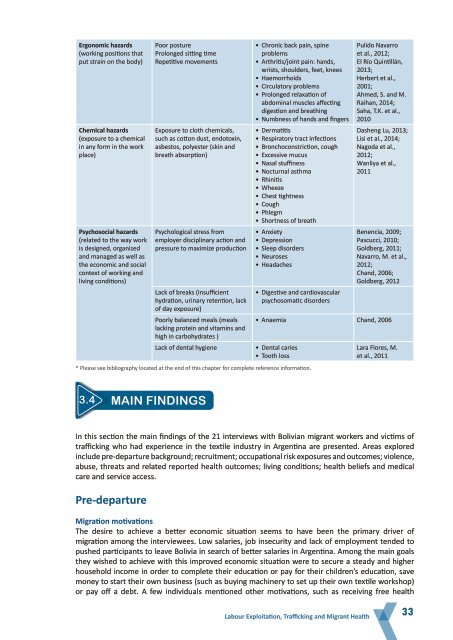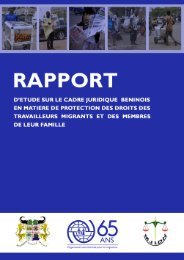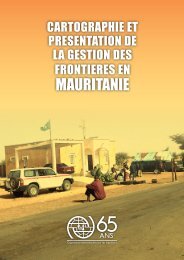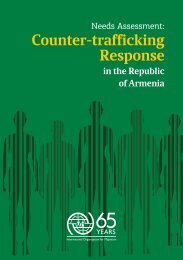Labour Exploitation Trafficking and Migrant Health
labour_exploitation_trafficking_en_0
labour_exploitation_trafficking_en_0
Create successful ePaper yourself
Turn your PDF publications into a flip-book with our unique Google optimized e-Paper software.
Ergonomic hazards<br />
(working positions that<br />
put strain on the body)<br />
Chemical hazards<br />
(exposure to a chemical<br />
in any form in the work<br />
place)<br />
Psychosocial hazards<br />
(related to the way work<br />
is designed, organized<br />
<strong>and</strong> managed as well as<br />
the economic <strong>and</strong> social<br />
context of working <strong>and</strong><br />
living conditions)<br />
Poor posture<br />
Prolonged sitting time<br />
Repetitive movements<br />
Exposure to cloth chemicals,<br />
such as cotton dust, endotoxin,<br />
asbestos, polyester (skin <strong>and</strong><br />
breath absorption)<br />
Psychological stress from<br />
employer disciplinary action <strong>and</strong><br />
pressure to maximize production<br />
Lack of breaks (insufficient<br />
hydration, urinary retention, lack<br />
of day exposure)<br />
Poorly balanced meals (meals<br />
lacking protein <strong>and</strong> vitamins <strong>and</strong><br />
high in carbohydrates )<br />
Lack of dental hygiene<br />
• Chronic back pain, spine<br />
problems<br />
• Arthritis/joint pain: h<strong>and</strong>s,<br />
wrists, shoulders, feet, knees<br />
• Haemorrhoids<br />
• Circulatory problems<br />
• Prolonged relaxation of<br />
abdominal muscles affecting<br />
digestion <strong>and</strong> breathing<br />
• Numbness of h<strong>and</strong>s <strong>and</strong> fingers<br />
• Dermatitis<br />
• Respiratory tract infections<br />
• Bronchoconstriction, cough<br />
• Excessive mucus<br />
• Nasal stuffiness<br />
• Nocturnal asthma<br />
• Rhinitis<br />
• Wheeze<br />
• Chest tightness<br />
• Cough<br />
• Phlegm<br />
• Shortness of breath<br />
• Anxiety<br />
• Depression<br />
• Sleep disorders<br />
• Neuroses<br />
• Headaches<br />
• Digestive <strong>and</strong> cardiovascular<br />
psychosomatic disorders<br />
Pulido Navarro<br />
et al., 2012;<br />
El Río Quintillán,<br />
2013;<br />
Herbert et al.,<br />
2001;<br />
Ahmed, S. <strong>and</strong> M.<br />
Raihan, 2014;<br />
Saha, T.K. et al.,<br />
2010<br />
Dasheng Lu, 2013;<br />
Lisi et al., 2014;<br />
Nagoda et al.,<br />
2012;<br />
Wanliya et al.,<br />
2011<br />
Benencia, 2009;<br />
Pascucci, 2010;<br />
Goldberg, 2011;<br />
Navarro, M. et al.,<br />
2012;<br />
Ch<strong>and</strong>, 2006;<br />
Goldberg, 2012<br />
• Anaemia Ch<strong>and</strong>, 2006<br />
• Dental caries<br />
• Tooth loss<br />
* Please see bibliography located at the end of this chapter for complete reference information.<br />
Lara Flores, M.<br />
et al., 2011<br />
3.4<br />
Main findings<br />
In this section the main findings of the 21 interviews with Bolivian migrant workers <strong>and</strong> victims of<br />
trafficking who had experience in the textile industry in Argentina are presented. Areas explored<br />
include pre-departure background; recruitment; occupational risk exposures <strong>and</strong> outcomes; violence,<br />
abuse, threats <strong>and</strong> related reported health outcomes; living conditions; health beliefs <strong>and</strong> medical<br />
care <strong>and</strong> service access.<br />
Pre-departure<br />
Migration motivations<br />
The desire to achieve a better economic situation seems to have been the primary driver of<br />
migration among the interviewees. Low salaries, job insecurity <strong>and</strong> lack of employment tended to<br />
pushed participants to leave Bolivia in search of better salaries in Argentina. Among the main goals<br />
they wished to achieve with this improved economic situation were to secure a steady <strong>and</strong> higher<br />
household income in order to complete their education or pay for their children’s education, save<br />
money to start their own business (such as buying machinery to set up their own textile workshop)<br />
or pay off a debt. A few individuals mentioned other motivations, such as receiving free health<br />
<strong>Labour</strong> <strong>Exploitation</strong>, <strong>Trafficking</strong> <strong>and</strong> <strong>Migrant</strong> <strong>Health</strong><br />
33





